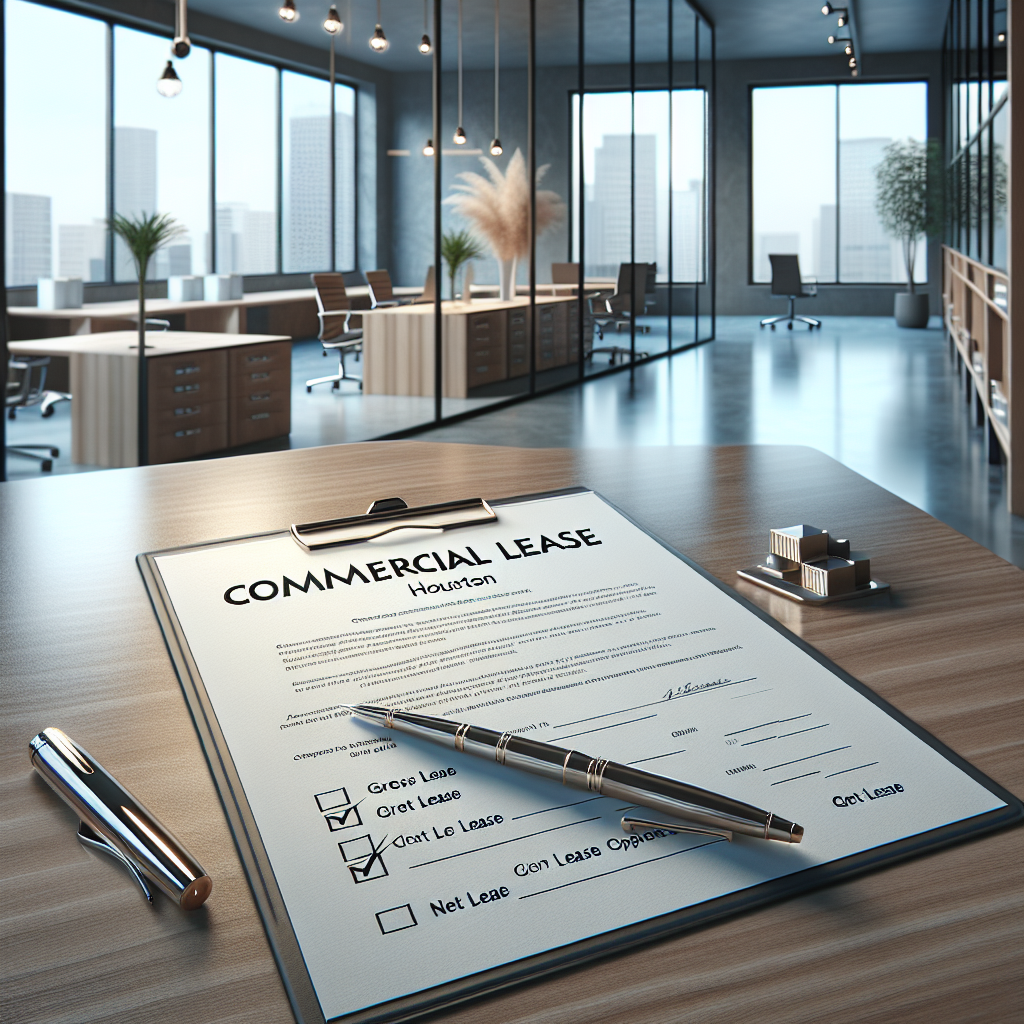When diving into commercial property leasing in Houston, it is essential to grasp the fundamental concepts that govern the process. Unlike residential leases, commercial leases are typically more complex and tailored to the specific needs of the business and property owner. Here are some key aspects to consider:
- Lease Types: Commercial leases vary widely, including gross leases, where the landlord covers all expenses, and net leases, which require the tenant to pay a portion of property taxes, insurance, and maintenance costs.
- Lease Terms: The duration of commercial leases can range from a few months to several years, often with renewal options. It’s crucial for tenants to negotiate terms that align with their business strategy.
- Space Requirements: Businesses must assess their space needs carefully, considering not only current requirements but also potential growth. This evaluation can influence the choice of location and the type of lease.
- Legal Obligations: Understanding the legal framework surrounding commercial leases, including tenant rights and landlord responsibilities, is vital. Engaging a knowledgeable real estate attorney or agent can mitigate risks.
Before signing a lease, potential tenants should conduct thorough due diligence, including property inspections and market analysis.
For more personalized guidance on navigating the complexities of commercial property leasing in Houston, call at 281-857-2000 today!
Key Factors in Selecting Commercial Properties

Choosing the right commercial property is a critical decision that can significantly impact the success of a business. Several key factors should be taken into account when selecting a commercial property:
- Location: The location of the property plays a pivotal role in attracting customers and ensuring accessibility for employees. Factors such as proximity to major highways, public transport, and competitor locations should be evaluated.
- Demographics: Understanding the demographics of the surrounding area is essential. Analyze the population density, income levels, and business activity in the vicinity to determine whether it aligns with your target market.
- Property Condition: Assessing the physical condition of the property is crucial. Conducting thorough inspections can uncover necessary repairs or renovations, which could influence overall costs and planning.
- Zoning Regulations: Each commercial property falls under specific zoning laws that dictate the types of businesses that can operate in the area. Ensure that the intended use of the property complies with local zoning regulations.
- Future Growth Potential: Consider the potential for future growth in the area. Properties in developing neighborhoods or regions with planned infrastructure improvements may offer better long-term investment opportunities.
By carefully evaluating these factors, businesses can make informed decisions that align with their operational goals and strategic vision.
Navigating Lease Agreements and Terms

Understanding lease agreements and their terms is essential for any business looking to secure commercial property. The lease serves as a binding contract that outlines the rights and responsibilities of both the landlord and tenant. Here are some critical components to navigate:
- Lease Type: Familiarize yourself with the different types of leases such as gross leases, net leases, and modified gross leases. Each type affects how expenses are shared between the landlord and tenant, influencing overall costs.
- Lease Duration: The length of the lease is a significant factor. Short-term leases offer flexibility but may come with higher rates, while long-term leases can provide stability and potentially lower monthly payments.
- Rent Escalation Clauses: These clauses dictate how and when rent will increase during the lease term. Understanding these provisions helps tenants prepare for future costs.
- Maintenance Responsibilities: Lease agreements often specify who is responsible for property maintenance and repairs. It’s crucial to clarify these responsibilities to avoid misunderstandings and unexpected expenses.
- Termination Clauses: Be aware of the conditions under which the lease can be terminated. This includes understanding penalties for early termination and the process for lease renewal.
By thoroughly reviewing and negotiating lease terms, businesses can protect their interests and ensure a smooth leasing experience.
The Importance of Location in Leasing

When it comes to commercial property leasing, the adage “location, location, location” could not be more accurate. The location of a business can significantly influence its success, making it a crucial factor in leasing decisions. Here are several reasons why location is paramount:
- Customer Accessibility: A prime location ensures that your business is easy for customers to find and access. High foot traffic areas can lead to increased visibility and more walk-in customers.
- Market Demographics: Understanding the demographics of the area is vital. A location should align with your target market’s preferences and needs. For instance, a trendy boutique may thrive in a vibrant urban setting, while a family-friendly restaurant may benefit from a suburban area.
- Competitor Proximity: Being near competitors can be double-edged. While it may mean increased competition, it can also draw customers who are shopping around. Analyzing the competitive landscape is essential in determining the best location for your business.
- Accessibility and Transportation: Consider the ease of access for both customers and employees. Locations near major highways, public transportation, and parking facilities can enhance convenience and attract more visitors.
- Future Development: Areas undergoing development or revitalization may present unique opportunities. Researching planned infrastructure improvements, new businesses, or zoning changes can provide insights into future growth and potential benefits for your lease.
In summary, the right location can be a game-changer for your business, directly impacting sales and brand perception.
Tips for Negotiating Better Lease Deals
Negotiating a commercial lease can be a daunting task, but with the right strategies, you can secure a deal that benefits your business. Here are some essential tips for negotiating better lease deals:
- Understand Market Trends: Research the current commercial real estate market in Houston. Knowing the average lease rates and terms for comparable properties will empower you during negotiations and help you identify fair offers.
- Clarify Your Needs: Before entering negotiations, clearly outline your requirements, including space size, layout, budget, and lease duration. This clarity will help you negotiate terms that align with your business objectives.
- Consider the Total Cost: Look beyond the base rent. Factor in additional costs such as maintenance, utilities, and property taxes. A lower base rent might be attractive, but hidden costs can add up.
- Be Prepared to Walk Away: Enter negotiations with the mindset that you are willing to walk away if the terms do not meet your needs. This attitude can strengthen your position and encourage landlords to offer more favorable terms.
- Seek Professional Help: Engaging a knowledgeable real estate agent or lawyer experienced in commercial leasing can provide valuable insights and help you navigate complex terms and conditions.
- Negotiate Flexibility: Consider asking for flexibility in lease terms, such as options for renewal, rent adjustments based on market conditions, or the ability to sublet the space. These clauses can provide significant advantages as your business evolves.
By employing these strategies, you can enhance your chances of negotiating a lease that not only meets your current needs but also supports your future growth.
Common Challenges and Solutions in Leasing

Leasing commercial property in Houston can come with its fair share of challenges. Understanding these common issues and their solutions can significantly smoothen the leasing process. Here are some typical challenges you might encounter:
- High Competition: The demand for prime commercial locations often leads to fierce competition among tenants. This can make it difficult to secure a favorable lease. Solution: Be proactive and start your search early to identify potential properties before others do.
- Complex Lease Terms: Commercial leases can be laden with complex legal jargon that may be difficult to understand. Solution: Consult with a real estate attorney or a knowledgeable agent who can help clarify terms and ensure you fully comprehend your obligations.
- Hidden Costs: Many tenants overlook additional costs associated with leasing, such as maintenance fees, property taxes, and insurance. Solution: Always request a detailed breakdown of all potential costs before signing a lease.
- Lease Negotiations: Negotiating a lease can be intimidating, and tenants may feel pressured to accept unfavorable terms. Solution: Prepare thoroughly, know your limits, and don’t hesitate to negotiate for better terms that reflect your needs.
- Landlord-Tenant Disputes: Disagreements regarding property maintenance or lease terms can arise, leading to disputes. Solution: Keep open lines of communication with your landlord, and document all agreements and discussions to avoid misunderstandings.
By being aware of these challenges and employing effective strategies, you can navigate the commercial leasing landscape in Houston more effectively. For personalized assistance and expert guidance in your leasing journey, call at 281-857-2000 or visit realtordaddy.com today!

